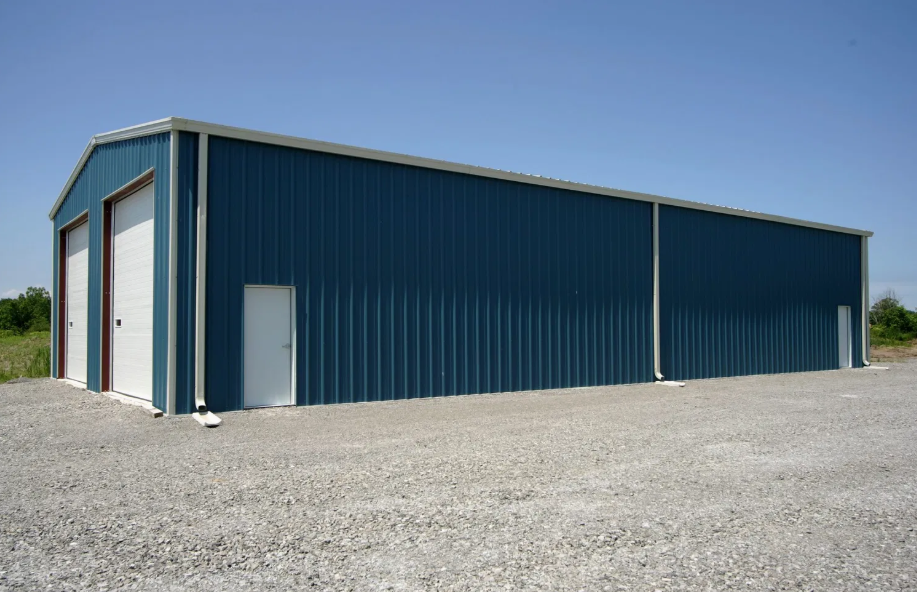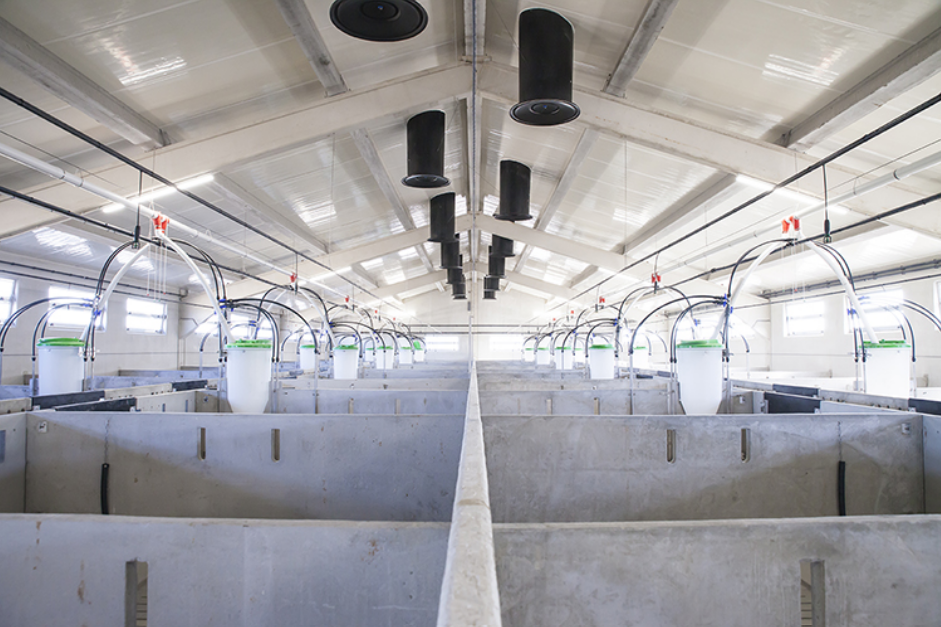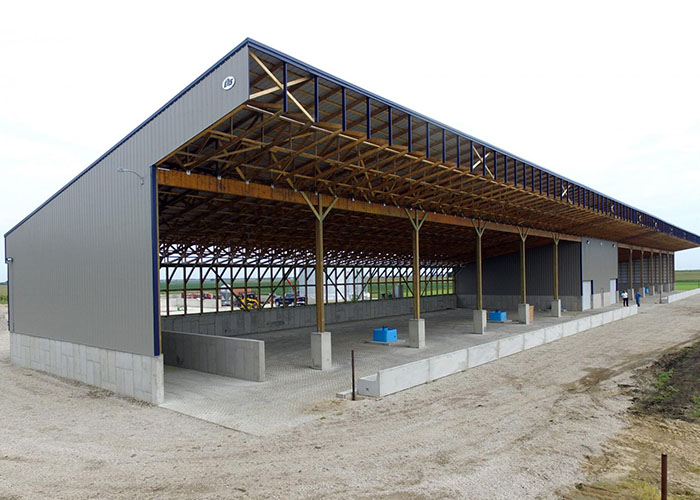🐔 Transforming Farming: How EPS Panels Improve Temperature Control in Agricultural Environments
In the fast-evolving world of modern farming, maintaining an optimal environment is key to ensuring healthy livestock, maximizing productivity, and protecting valuable produce. Factors such as temperature fluctuations, humidity, and energy efficiency can significantly impact overall farm profitability. This is where EPS Panels (Expanded Polystyrene Panels) can revolutionize your agricultural setup. EPS panels are also used in freezer rooms to maintain low temperatures and preserve agricultural products.


🌡️ Why Temperature Control Matters in Farming
Agricultural operations, from livestock farming to crop storage, are highly sensitive to temperature fluctuations. Extreme heat can lead to heat stress, reduced productivity, and spoilage of perishable goods, while cold temperatures can weaken livestock immune systems and damage stored crops. A stable, controlled environment is essential for maintaining high-quality output, and EPS Panels provide an ideal solution. Their excellent insulation properties help farmers create energy-efficient, temperature-controlled environments, boosting productivity and reducing operational costs year-round.
EPS panels are also used in clean rooms to maintain hygiene and control bacteria in sensitive agricultural environments.
✅Key Benefits of Using EPS Insulated Panels in Farming
- Superior Insulation for Stable Temperatures
EPS Panels help maintain consistent temperatures inside livestock shelters, storage rooms, and greenhouses, regardless of external weather conditions. This improves animal welfare, extends the shelf life of stored goods, and enhances crop yield. - Energy Efficiency
By minimizing heat exchange, EPS Panels reduce the need for artificial heating and cooling systems. This translates into significant savings on energy bills, making farms more cost-effective and environmentally friendly. - Durability and Resistance
Moisture-resistant and immune to pests and mold, EPS Panels are perfect for demanding agricultural environments, ensuring long-lasting performance and protecting your investment. - Easy Installation
Lightweight and simple to handle, EPS Panels can be installed quickly without disrupting daily operations, reducing both labor costs and downtime. - Enhanced Biosecurity
With smooth, non-porous surfaces, EPS Panels are easy to clean and disinfect, helping prevent the spread of diseases in livestock facilities. - Maintenance Free
EPS Panels offer a maintenance-free solution with their durable and low upkeep requirements. The attractive internal finish of these panels ensures they remain in excellent condition with minimal care, making them ideal for hassle-free construction.
🔍 Types of Insulated Panels
Insulated panels come in various types, each designed to cater to specific needs and applications. The most common types of insulated panels include:
-
Sandwich Panels: These panels consist of two steel faces bonded to an expanded polystyrene (EPS) insulation core. They are ideal for cool rooms, cold storage facilities, and controlled environments due to their excellent thermal insulation properties and durability.
-
EPS-FR Panels: Featuring a unique antibacterial technology, EPS-FR panels reduce the risk of cross-contamination and inhibit the growth of surface bacteria. This makes them perfect for applications where hygiene is paramount, such as food handling and laboratory facilities.
-
Insulated Roof Panels: Designed to provide thermal insulation and weather-tightness for roofs, these panels are available in various profiles, including trim deck and corrugated. They ensure that your agricultural buildings remain energy-efficient and protected from the elements.
-
Insulated Wall Panels: These panels offer thermal insulation and weather-tightness for walls. Available in various thicknesses and lengths, they can be customized to suit different applications, ensuring optimal performance in any setting.
🔥 Fire Safety and Insulated Panels
Fire safety is a critical consideration when it comes to insulated panels. The good news is that many insulated panels are designed with fire safety in mind. For example:
-
EPS-FR Panels: These panels feature a fire retardant core that reduces the risk of fire spreading, providing an added layer of safety for your agricultural facilities.
-
Sandwich Panels: Designed to meet strict fire safety standards, including the Australian Standard AS 1530.1, sandwich panels offer reliable protection against fire hazards.
-
Fire-Rated Wall Solutions: Insulated panels can be used to create fire-rated wall solutions that meet the requirements of the Building Code of Australia, ensuring compliance with national safety standards.
-
Bushfire Attack Level (BAL) Certification: Many insulated panels are also designed to meet the requirements of the Bushfire Attack Level (BAL) certification, providing peace of mind in areas prone to bushfires.
❄️ Cold Storage Solutions
Cold storage solutions are a critical component of many industries, including food processing, pharmaceuticals, and logistics. Insulated panels are an ideal solution for cold storage facilities, offering:
-
High-Performance Thermal Insulation: Insulated panels maintain consistent temperatures, ensuring that perishable goods remain fresh and safe.
-
Durability and Reliability: Built to withstand the rigors of cold storage, these panels offer long-lasting performance and protection for your valuable products.
-
Easy Installation and Maintenance: Insulated panels are designed for quick and easy installation, minimizing downtime and ensuring that your cold storage facilities remain operational.
-
Compliance with Safety Standards: Insulated panels meet strict food safety and hygiene standards, making them suitable for use in environments where cleanliness is crucial.
-
Customization Options: Available in various sizes and specifications, insulated panels can be tailored to meet the specific needs of your cold storage facility.
🌿 Energy Efficiency and Insulated Panels
Insulated panels are an energy-efficient solution for various applications, including cool rooms, cold storage facilities, and controlled environments. They offer:
-
High-Performance Thermal Insulation: By reducing energy consumption, insulated panels help lower operational costs and contribute to a more sustainable farming operation.
-
Durability and Reliability: These panels are built to last, minimizing maintenance and replacement costs over time.
-
Easy Installation and Maintenance: Designed for quick setup, insulated panels ensure minimal disruption to your daily operations.
-
Compliance with Energy Efficiency Standards: Insulated panels meet strict energy efficiency standards, helping you achieve regulatory compliance and reduce your carbon footprint.
-
Customization Options: With various sizes and specifications available, insulated panels can be customized to meet the specific energy efficiency needs of your facility.

Real-World Examples: How Farmers Benefit from EPS Panels in Cold Storage
Poultry Farming A medium-sized poultry farm struggled with high energy costs and poor bird growth during seasonal temperature fluctuations. After installing EPS Panels in their chicken housing:
- They reported a 20% improvement in bird growth rates due to better temperature control.
- Their energy costs dropped by 30% within three months.
- Bird health improved, leading to lower mortality rates.
🔨 How to Implement EPS Panels on Your Farm
Assess Your Farm’s Requirements:
- Identify areas where temperature control is crucial, such as livestock shelters, greenhouses, or storage facilities.
- Choose the Right Panel Specifications: Select the ideal thickness and size of EPS Panels to suit your specific needs. Professional Installation: Hire experienced contractors or follow DIY installation guides for quick setup.
- Regular Monitoring: Track temperature and humidity levels to ensure optimal performance.
❓ Frequently Asked Questions (FAQs)
Q1: Are EPS Panels safe for use in farming environments? Yes! EPS Panels are non-toxic, environmentally friendly, and safe for use in various farming applications.
Q2: How long do EPS Panels last in agricultural settings? With proper care and maintenance, EPS Panels can last up to 20 years, even in challenging environments.
Q3: Can EPS Panels be used for different farming applications? Absolutely. EPS Panels are suitable for livestock shelters, greenhouses, crop storage facilities, and cool rooms for dairy and poultry farms.
Q4: How can I get started with EPS panels for my farm? You can request a free quote to understand the costs and benefits tailored to your specific needs.
